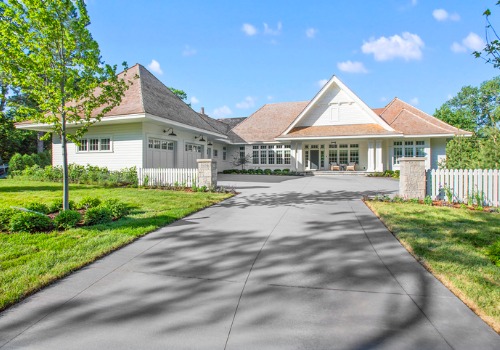
Head-to-Head: Asphalt Vs. Concrete – Which Should You Use for Your Driveway?
In the world of pavement, there are two main options for paving your driveway: concrete or asphalt. Living in the Midwest, there’s no clear-cut answer as to which pavement type you should choose. Both asphalt and concrete have unique advantages and drawbacks to consider. Thankfully, Hoerr’s Blacktop & Sealcoating are knowledgeable on both pavement types! Our experience installing and maintaining asphalt and concrete pavement gives us an informed perspective on what material type is better for your property. Before deciding for yourself, allow Hoerr’s to explain the aspects each pavement type excels in or lacks.
Which Material is More Durable?
- Asphalt – There’s a good reason why asphalt is primarily used to pave most roadways throughout the Midwest. Asphalt’s flexibility makes it incredibly versatile in many weather conditions and under varying degrees of stress. Now consider how your driveway sees significantly less traffic than a main road or highway, and you can expect the pavement to continue looking great for years to come.
- Concrete – Concrete is well known for its strength and toughness! Once properly cured, a concrete driveway can endure some of the heaviest loads. Although asphalt can similarly manage heavy loads, concrete pavement has more underlying support. Concrete can also withstand wear and tear and specific weather conditions better than asphalt.
- The Verdict – Although asphalt is a strong contender (literally), concrete pavement takes the cake in terms of being a more durable material. If you are concerned about whether your driveway or paved lot can support the weight of your cars, trucks, and recreational vehicles, concrete can put those worries to rest.
Which Material Requires More Maintenance?
- Asphalt – This paving material typically requires more care to maintain its top condition. By sealcoating your driveway every two to three years, you help protect asphalt against deterioration caused by UV rays, chemical spills and harsh weather conditions. Regular crack repair is also a part of asphalt maintenance and upkeep. However, even though it requires more maintenance, implementing such care is relatively simple and affordable for most homeowners.
- Concrete – Because concrete pavement is more durable than asphalt, it requires less maintenance. Sealing is advisable every few years to protect against moisture intrusion and staining, but this service is much less frequent than the care required for asphalt. The major downside to concrete maintenance is its expense and complexity. Repairing concrete isn’t simple and can require more work than standard asphalt.
- The Verdict – Concrete is your best choice if you want to avoid maintaining your pavement. However, if you don’t mind more consistent maintenance, asphalt pavement saves you the risk of requiring complicated, expensive care.

Which Material is More Expensive?
- Asphalt – Asphalt generally tends to have a lower initial installation cost than concrete. Because asphalt is made of more accessible and easily recyclable materials, the price is much more affordable. Plus, asphalt installation is quicker and more straightforward, meaning less associated labor costs. While more maintenance is required for asphalt, the costs for care are much lower than for concrete.
- Concrete – In contrast, installing a concrete driveway is more labor-intensive and requires harder-to-secure materials. Pouring and curing concrete requires more attention and is easier to mess up if not handled by a professional. As for maintenance, because concrete requires significantly less, repairs associated with concrete aren’t as frequent. This means a concrete lot or driveway is more cost-effective in the long term.
- The Verdict – Although asphalt’s initial price is significantly lower than concrete, the associated costs for asphalt’s care drive that price up over time. If you need a quick and affordable paving solution, asphalt has you covered, but if you can afford the installation cost of concrete, you’ll save more over the lifetime of your pavement.

How Well Does Each Material Hold Up in Extreme Temperatures?
- Asphalt – As mentioned, asphalt is a flexible material that can adapt to varying temperatures without much cracking. This flexibility is crucial for asphalt in the summer months, as the tar on roadways softens due to heat. However, asphalt can soften too quickly when temperatures become too high, causing deterioration issues. In winter, asphalt can become brittle and more susceptible to cracks or potholes if temperatures become too low. But, overall, asphalt can withstand cold better than heat.
- Concrete – Under the sun’s intense heat, concrete pavement can more easily reflect light, which makes it cooler to the touch in the spring and summer. However, when winter rolls around, concrete has more difficulty handling colder temperatures. Being a more rigid material, concrete will more easily crack when frozen and thawed. Road salt and snowplows also risk damaging concrete more than asphalt.
- The Verdict – There’s no clear choice for which paving material is better under harsh climates and temperatures. While asphalt can handle the cold, concrete is better in the heat. And if you’ve lived in the Midwest for any time, you understand how drastically temperatures can shift day by day, season by season. Many of our clients select a mix of concrete and asphalt for their property’s various pavement surfaces.

Which Will You Pick?
Is budget a concern of yours? Pick asphalt. Do you not want to worry about excessive maintenance of your pavement? Choose concrete. Ultimately, there’s no “winner” when selecting the best pavement material for your property. It all comes down to your preferences, budget constraints, and what you think will look best with your home. Thankfully, no matter what material type you choose, Hoerr’s Blacktop & Sealcoating contractors can assist with both. We are Central Illinois’ choice for beautiful, practical, long-lasting pavement installation, repair and maintenance. To learn more about our services, contact Hoerr’s Blacktop & Sealcoating today at
309-222-2979 or complete an online form.

